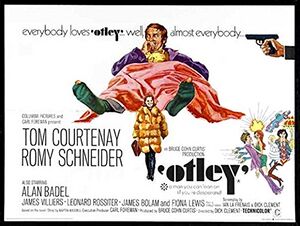Otley (film)
| Otley | |
|---|---|
 British theatrical poster | |
| Directed by | Dick Clement |
| Written by | Ian La Frenais Dick Clement |
| Based on | the novel Otley by Martin Waddell |
| Produced by | Bruce Cohn Curtis |
| Starring | Tom Courtenay Romy Schneider |
| Cinematography | Austin Dempster |
| Edited by | Richard Best |
| Music by | Stanley Myers |
Production companies | Highroad Productions Bruce Cohn Curtis Films, Ltd. |
| Distributed by | Columbia Pictures |
Release dates |
|
Running time | 91 minutes |
| Country | United Kingdom |
| Language | English |
Otley is a 1968 British comedy thriller film, starring Tom Courtenay and Romy Schneider.[1] It was adapted by Dick Clement and Ian La Frenais from a book by Martin Waddell, and released by Columbia Pictures.[2]
Plot
Tom Courtenay plays Gerald Arthur "Gerry" Otley, a charming but feckless young drifter who scrapes a living from selling antiques in trendy 1960s London. Gerry's responsibility-free life suddenly takes a serious turn, when he finds himself caught up in a round of murder, espionage and quadruple crossing. He is mistaken for a spy; is kidnapped and detained several times; and becomes romantically involved with a foreign agent (Romy Schneider) working for British Intelligence.
Cast
- Tom Courtenay .... Gerald Arthur Otley - "Gerry"
- Romy Schneider .... Imogen
- Alan Badel .... Sir Alec Hadrian
- James Villiers .... Hendrickson
- Leonard Rossiter .... Johnson
- Freddie Jones .... Philip Proudfoot
- Fiona Lewis .... Lin
- James Bolam .... Albert
- James Cossins .... Geffcock
- James Maxwell .... Rollo
- Edward Hardwicke .... Lambert
- Ronald Lacey .... Curtis
- Phyllida Law .... Jean
- Geoffrey Bayldon .... Inspector Hewett
- Frank Middlemass .... Bruce (as Frank Middlemas)
- Barry Fantoni .... Larry
Production
The exterior action takes place in a number of recognisable London locations: the area around Portobello Road street market in Notting Hill; a houseboat colony near Cheyne Walk in Chelsea; Bowater House in Knightsbridge; the Playboy Club in Park Lane; and the old Unilever milk depot in Wood Lane. A wide range of period British vehicles is featured: Otley drives an E-Type Jaguar, a Ford Anglia and an early 1960s passenger coach, and his disastrous driving test, which turns into an epic car chase, involves a driving-school Vauxhall Viva and a Ford Zephyr.
The film, whose interiors were shot at Shepperton Studios, marked the directorial debut of Dick Clement. He and Ian La Frenais, famous at the time for writing The Likely Lads, wrote the script.
Don Partridge co-wrote and performed the title music, "Homeless Bones", which was also released as the B-side of his single "Colour My World" (1969).
Awards
The film in 1970 won the Writers' Guild of Great Britain Award as Best British Comedy Screenplay.[3]
Reception
Vincent Canby of The New York Times wrote, "Like Otley, the movie is a bad risk. Everything in it is borrowed and badly used—actors (Tom Courtenay, Alan Badel), situations (the triumph of the fraudulent fool) and even settings, including a rather handsome Thames houseboat that reminded me wistfully of 'The Horse's Mouth.' 'Otley' is the kind of movie that allows you to think about other movies, in those great gaps of time between the setting up of a gag and the moment when it is ritualistically executed."[4] Gene Siskel of the Chicago Tribune wrote that the film was so boring it "could put Sominex out of business"[5] and admitted to walking out on it, reporting, "I took the CTA to see 'Otley' at the Coronet theater in Evanston. The film began at 6:15 p. m. I returned home on the 7 p. m. train."[6] Variety wrote that "the film has an uneasy lack of a point of view and fails to focus viewer's attention on any particular character or plotline philosophy. The frantic, intentionally incoherent episodes are sometimes amusing, but too often suffer from unoriginality."[7] Judith Crist described it as "a bright, breezy, light-handed but never lightheaded spies-and-counterspies story".[8] Jack Ibberson of The Monthly Film Bulletin was also positive, calling it a "vastly entertaining comedy-thriller" with "uniformly excellent" performances.[9]
References
- ^ "Otley (1968)". BFI.
- ^ Gifford, Denis (1 April 2016). British Film Catalogue: Two Volume Set - The Fiction Film/The Non-Fiction Film. Routledge. ISBN 9781317740629 – via Google Books.
- ^ "Awards". IMDb.com. Retrieved 2020-02-03.
- ^ Canby, Vincent (12 March 1969). "Screen: 'Otley' Arrives From Britain". The New York Times. 42.
- ^ Siskel, Gene (4 January 1970). "Last Year's 20 Biggest Bombs from Filmland". Chicago Tribune. Section 5, p. 1.
- ^ Siskel, Gene (26 November 1969). "Short Subjects". Chicago Tribune. Section 2, p. 5.
- ^ "Film Reviews: Otley". Variety. 22 January 1969. 6, 24.
- ^ Crist, Judith. This Week's Movies. TV Guide, North Carolina Edition, 9–15 December 1972, pg A-4
- ^ Ibberson, Jack (July 1969). "Otley". The Monthly Film Bulletin. 36 (426): 142.
External links
- Articles with short description
- Template film date with 1 release date
- IMDb title ID not in Wikidata
- 1969 films
- British comedy thriller films
- British spy comedy films
- Columbia Pictures films
- Films set in London
- Films shot in London
- 1960s comedy thriller films
- 1960s spy comedy films
- Films scored by Stanley Myers
- Films with screenplays by Dick Clement
- Films directed by Dick Clement
- Films with screenplays by Ian La Frenais
- 1969 comedy films
- 1960s English-language films
- 1960s British films
- British comedy films